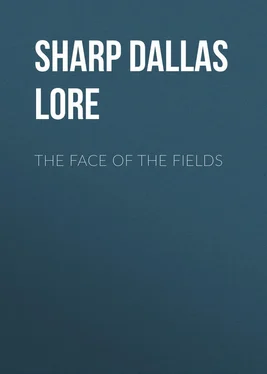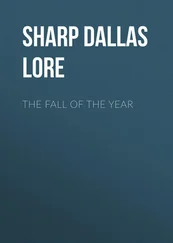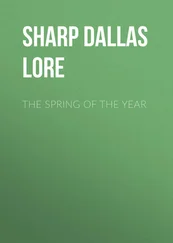Dallas Sharp - The Face of the Fields
Здесь есть возможность читать онлайн «Dallas Sharp - The Face of the Fields» — ознакомительный отрывок электронной книги совершенно бесплатно, а после прочтения отрывка купить полную версию. В некоторых случаях можно слушать аудио, скачать через торрент в формате fb2 и присутствует краткое содержание. Жанр: Природа и животные, foreign_antique, foreign_prose, на английском языке. Описание произведения, (предисловие) а так же отзывы посетителей доступны на портале библиотеки ЛибКат.
- Название:The Face of the Fields
- Автор:
- Жанр:
- Год:неизвестен
- ISBN:нет данных
- Рейтинг книги:5 / 5. Голосов: 1
-
Избранное:Добавить в избранное
- Отзывы:
-
Ваша оценка:
- 100
- 1
- 2
- 3
- 4
- 5
The Face of the Fields: краткое содержание, описание и аннотация
Предлагаем к чтению аннотацию, описание, краткое содержание или предисловие (зависит от того, что написал сам автор книги «The Face of the Fields»). Если вы не нашли необходимую информацию о книге — напишите в комментариях, мы постараемся отыскать её.
The Face of the Fields — читать онлайн ознакомительный отрывок
Ниже представлен текст книги, разбитый по страницам. Система сохранения места последней прочитанной страницы, позволяет с удобством читать онлайн бесплатно книгу «The Face of the Fields», без необходимости каждый раз заново искать на чём Вы остановились. Поставьте закладку, и сможете в любой момент перейти на страницу, на которой закончили чтение.
Интервал:
Закладка:
Life, like Law and Matter, is all of one piece. The horse in my stable, the robin, the toad, the beetle, the vine in my garden, the garden itself, and I together with them all, come out of the same divine dust; we all breathe the same divine breath; we have our beings under the same divine law; only they do not know that the law, the breath, and the dust are divine. If I do know, and yet can so readily forget such knowledge, can so hardly cease from being, can so eternally find the purpose, the hope, the joy of life within me, how soon for them, my lowly fellow mortals, must vanish all sight of fear, all memory of pain! And how abiding with them, how compelling, the necessity to live! And in their unquestioning obedience what joy!
The face of the fields is as changeful as the face of a child. Every passing wind, every shifting cloud, every calling bird, every baying hound, every shape, shadow, fragrance, sound, and tremor, are so many emotions reflected there. But if time and experience and pain come, they pass utterly away; for the face of the fields does not grow old or wise or seamed with pain. It is always the face of a child, – asleep in winter, awake in summer, – a face of life and health always, if we will but see what pushes the falling leaves off, what lies in slumber under the covers of the snow; if we will but feel the strength of the north wind, and the wild fierce joy of the fox and hound as they course the turning, tangling paths of the woodlands in their race with one another against the record set by Life.
II
TURTLE EGGS FOR AGASSIZ
ITis one of the wonders of the world that so few books are written. With every human being a possible book, and with many a human being capable of becoming more books than the world could contain, is it not amazing that the books of men are so few? And so stupid!
I took down, recently, from the shelves of a great public library, the four volumes of Agassiz’s “Contributions to the Natural History of the United States.” I doubt if anybody but the charwoman, with her duster, had touched those volumes for twenty-five years. They are an excessively learned, a monumental, an epoch-making work, the fruit of vast and heroic labors, with colored plates on stone, showing the turtles of the United States, and their embryology. The work was published more than half a century ago (by subscription); but it looked old beyond its years – massive, heavy, weathered, as if dug from the rocks. It was difficult to feel that Agassiz could have written it – could have built it, grown it, for the laminated pile had required for its growth the patience and painstaking care of a process of nature, as if it were a kind of printed coral reef. Agassiz do this? The big, human, magnetic man at work upon these pages of capital letters, Roman figures, brackets, and parentheses in explanation of the pages of diagrams and plates! I turned away with a sigh from the weary learning, to read the preface.
When a great man writes a great book he usually flings a preface after it, and thereby saves it, sometimes, from oblivion. Whether so or not, the best things in most books are their prefaces. It was not, however, the quality of the preface to these great volumes that interested me, but rather the wicked waste of durable book-material that went to its making. Reading down through the catalogue of human names and of thanks for help received, I came to a sentence beginning: —
“In New England I have myself collected largely; but I have also received valuable contributions from the late Rev. Zadoc Thompson of Burlington; … from Mr. D. Henry Thoreau of Concord; … and from Mr. J. W. P. Jenks of Middleboro’.” And then it hastens on with the thanks in order to get to the turtles, as if turtles were the one and only thing of real importance in all the world.
Turtles no doubt are important, extremely important, embryologically, as part of our genealogical tree; but they are away down among the roots of the tree as compared with the late Rev. Zadoc Thompson of Burlington. I happen to know nothing about the Rev. Zadoc, but to me he looks very interesting. Indeed, any reverend gentleman of his name and day who would catch turtles for Agassiz must have been interesting. And as for D. Henry Thoreau, we know he was interesting. The rarest wood-turtle in the United States was not so rare a specimen as this gentleman of Walden Woods and Concord. We are glad even for this line in the preface about him; glad to know that he tried, in this untranscendental way, to serve his day and generation. If Agassiz had only put a chapter in his turtle book about it! But this is the material he wasted, this and more of the same human sort; for the “Mr. J. W. P. Jenks of Middleboro’” (at the end of the quotation) was, some years later, an old college professor of mine, who told me a few of the particulars of his turtle contributions, particulars which Agassiz should have found a place for in his big book. The preface, in another paragraph, says merely that this gentleman sent turtles to Cambridge by the thousands – brief and scanty recognition! For that is not the only thing this gentleman did. On one occasion he sent, not turtles, but turtle eggs to Cambridge — brought them, I should say; and all there is to show for it, so far as I could discover, is a sectional drawing of a bit of the mesoblastic layer of one of the eggs!
Of course, Agassiz wanted to make that mesoblastic drawing, or some other equally important drawing, and had to have the fresh turtle egg to draw it from. He had to have it, and he got it. A great man, when he wants a certain turtle egg, at a certain time, always gets it, for he gets some one else to get it. I am glad he got it. But what makes me sad and impatient is that he did not think it worth while to tell about the getting of it, and so made merely a learned turtle book of what might have been an exceedingly interesting human book.
It would seem, naturally, that there could be nothing unusual or interesting about the getting of turtle eggs when you want them. Nothing at all, if you should chance to want the eggs as you chance to find them. So with anything else, – good copper stock, for instance, if you should chance to want it, and should chance to be along when they chance to be giving it away. But if you want copper stock, say of C & H quality, when you want it, and are bound to have it, then you must command more than a college professor’s salary. And likewise, precisely, when it is turtle eggs that you are bound to have.
Agassiz wanted those turtle eggs when he wanted them – not a minute over three hours from the minute they were laid. Yet even that does not seem exacting, hardly more difficult than the getting of hen eggs only three hours old. Just so, provided the professor could have had his private turtle-coop in Harvard Yard; and provided he could have made his turtles lay. But turtles will not respond, like hens, to meat-scraps and the warm mash. The professor’s problem was not to get from a mud turtle’s nest in the back yard to the table in the laboratory; but to get from the laboratory in Cambridge to some pond when the turtles were laying, and back to the laboratory within the limited time. And this, in the days of Darius Green, might have called for nice and discriminating work – as it did.
Agassiz had been engaged for a long time upon his “Contributions.” He had brought the great work nearly to a finish. It was, indeed, finished but for one small yet very important bit of observation: he had carried the turtle egg through every stage of its development with the single exception of one – the very earliest – that stage of first cleavages, when the cell begins to segment, immediately upon its being laid. That beginning stage had brought the “Contributions” to a halt. To get eggs that were fresh enough to show the incubation at this period had been impossible.
Читать дальшеИнтервал:
Закладка:
Похожие книги на «The Face of the Fields»
Представляем Вашему вниманию похожие книги на «The Face of the Fields» списком для выбора. Мы отобрали схожую по названию и смыслу литературу в надежде предоставить читателям больше вариантов отыскать новые, интересные, ещё непрочитанные произведения.
Обсуждение, отзывы о книге «The Face of the Fields» и просто собственные мнения читателей. Оставьте ваши комментарии, напишите, что Вы думаете о произведении, его смысле или главных героях. Укажите что конкретно понравилось, а что нет, и почему Вы так считаете.












